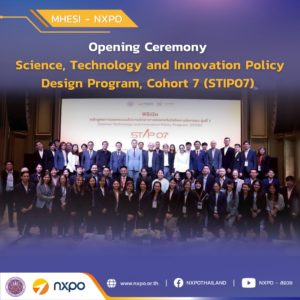
On 8 May 2024, NXPO and the Hydro – Informatics Institute (Public Organization), or HII, convened a stakeholder meeting for the formulation of “Hydro-informatics for Future Thailand” policy framework. The event commenced with an opening address by NXPO President Dr. Kitipong Promwong and HII Director Dr. Royboon Rassamethes. The meeting featured a knowledge-sharing session on water management best practices, followed by discussions involving representatives from various sectors, including communities, farmers councils, provincial water information centers, water management innovators, university researchers, and relevant organizations.

In his address, Dr. Kitipong underscored the pressing need for sustainable water management in the face of climate change and its implications on trade, water availability, and weather pattern. As a government body overseeing higher education, science, research, and innovation policy, NXPO has placed great emphasis on water management technology and innovation, including climate technology. Integrating both advanced and appropriate technologies into community-level water management can strengthen water security and capacity for communities, ultimately contributing to national security. Key issues to be investigated in developing the water management policy include technology acquisition, technology-user compatibility, and a supportive ecosystem. This policy framework aims to integrate innovation and technology into water management at all levels. Stakeholder engagement is essential to ensure that the policy framework addresses actual issues faced by the communities. Dr. Kitipong expressed gratitude to HII for their collaboration and support in advancing sustainable water management.

Dr. Royboon emphasized that this meeting serves to involve stakeholders in the policymaking process, fostering policies that promote water management innovation and bolster water management at all levels.
Throughout the meeting, water management best practices were shared by various organizations, including water resources management centers, farmers councils, local communities, disaster warning centers, and universities from several provinces, including Phrae, Lamphun, Trang, Nakhon Pathom, Prachinburi, Khon Kaen, Nan and Pattani. These insights will inform the development of the policy framework, which will be presented to the Policy Council.











